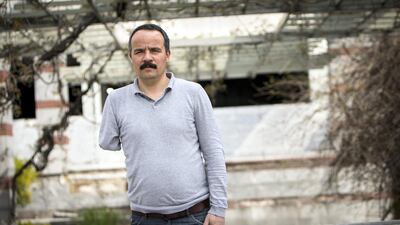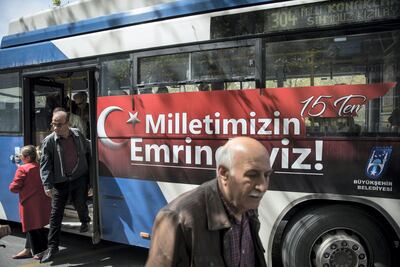Veli Sacilik’s seven-year-old daughter thinks her father’s full-time job is trying to get his job back. “Because my daughter knows I will be going on protests and demonstrations every day,” he said, “she thinks this is my daily employment.”
Mr Sacilik is one of more than a million people in Turkey who have fallen foul of the ongoing state of emergency, which was put in place following an attempted coup in July 2016. After parliamentary approval yesterday, and despite widespread protests on Monday and concerns expressed by both the United States and the European Union, the seventh extension of the temporary measures came into effect today.
Many fear the state of emergency has already led to widespread human rights offences. Last month, a report from the United Nations High Commissioner for Human Rights said that at least 152,000 civil servants have been dismissed since it was first declared.
At least 159,500 people have been arrested in relation to the emergency decrees and, in July 2016 50,000 passports were cancelled. A large number of people have left Turkey in search of temporary political asylum. The situation, said the UN, may have long-lasting socio-economic implications for the country.
Mr Sacilik, who lost an arm in 2000 in a violent accident that he believes was act of intimidation by the Turkish police, was previously a sociologist working as a civil servant for the department of disabled and care for the elderly, before the bloodiest coup attempt in the country’s history.
But five days after the putsch, when the state of emergency was declared and the purges began, he found his name among the thousands listed online on the government’s official gazette.
“It said that I was somehow linked with illegal organisations,” he said.
And since then he has been unable to find work as businesses are too worried they will be penalised for employing him and others on the list.
From the 4,000 Turkish lira (Dh3,628) a month wage he used to support his family on, he, his wife and daughter now live off just the TL1,350 they receive from rent and union support. They have also had their passports cancelled.
For 442 days and nights he took to the streets around Ankara’s human rights monument to protest, and every day he was detained. Sometimes, he says, he was also the victim of police violence. His shoulder was broken, his spine injured and tear gas was sprayed on him.
His wife and mother were also harmed – all on the grounds that their activities around the statue made them obstacles to passing traffic. When Mr Sacilik complained, the police said they were just carrying out their duties. He is now forced to stand trial several times a week.
“They didn’t pay much attention to me in the very beginning,” he said. “However, the more people got to know me in Turkey, they started saying: ‘these people are leftist, they are not Gulenists – those associated with Islamic cleric Fettullah Gulen, who the government holds responsible for the coup – at all. On what grounds are they to be jailed?’”
The monument, a statue of a woman reading the universal declaration of human rights, is now ringed with police barriers to “prevent us from protesting,” Mr Sacilik said.
“It is an image that is actually a good summary of the situation in Turkey at the moment.”
______________
Read more:
Turkey orders 70 army officers detained over Gulen links
Moody's slashes Turkey's credit rating further
Post-coup crackdown sees Turkish universities slide in global ratings
_______________
According to Yidirim Kaya, a party council member of the opposition CHP and head of their commission to help victims of the state of emergency, more than two million people have been impacted in some way by the extraordinary measures.
“They have separated from their wives. Their children have become depressed. They have lost their minds. They have committed suicide. They have gone so far as to kill others.
"And their relations with their neighbours have broken down. And as a whole, not only them but those around them have begun to have psychological problems,” he said.
Around 65 per cent of purged civil servants are now unemployed and somewhere around 50 men have killed themselves since the widespread purges took effect.
“A teacher came to me. For around a year he put on a suit in the mornings, left without telling anyone, even the kids, as if he was going to work. He actually sat in the coffeehouse and drank tea and then came home, he cried sometimes,” Mr Kaya said.
Trained professionals, he said, "now work on the black market, without insurance or unionisation. They do manual work or construction work for very low pay, like pickaxing, painting, serving tea or cleaning jobs, chauffeuring."
And the ones who find work are lucky. Karen Lim, who is from the Philippines, married to a Turk and a mother of one, had been an English teacher at Turgut Ozal University. She spent more than a year unable to work after she was arrested in November 2016 and awaited a court order on her deportation.
She spent time in jail and 12 days at a repatriation centre where her 14-month old daughter, Huma, contracted a respiratory infection. Yet all she was told by police was that she was "a threat to national security" because the institution she worked for had been associated with Gulen.
“The absurdity of my situation makes one think where the hell is Turkey going?” she said.
"The elephants are fighting and the ants are being crushed. We are just the ants, and we are suffering the most," said Lydia, a European national who also used to work as a teacher and asked that her real name not be used for security reasons. She was deported with her three year old around the same time, leaving her husband in Turkey pending a court hearing.
According to Mr Kaya, Mr Sacilik and other victims who spoke to The National, the purpose of these measures is to ensure that Erdogan and his AKP party hold on to power until the next presidential election, as the country transitions from a parliamentary system to a presidential one.
On Wednesday, Turkey declared early elections for June 24, 18 months earlier than expected. Attempts to contact the Turkish government went unanswered. "It is to liquidify and dispose of any opposition," said Mr Sacilik.
Yet, he and many others remain optimistic. “I have hopeful anger,” said Mr Sacilik. “I always say this during my protests, ‘you may be very strong and we are very right, and therefore you are doomed to lose and fail’…we will absolutely win in the end.”



